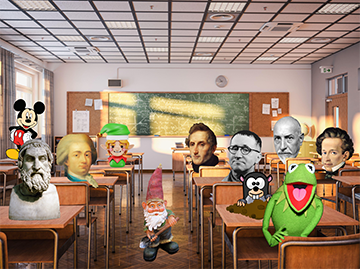Escape from the confines of an anthropocentric theatre to break down the barrier between “human” and “animal”: Marta Cuscunà invites the audience to follow her to the south-east of Milan where, twice a year, a flock of sheep rests during transhumance. It is an experience that sees the coming together of two worlds, in which the confine between Nature and Culture loses all meaning.
-
Parco di Porto di Mare
Geolinguistics (noun): a study of languages of communities of living, and at times, non-living, beings.
Vinciane Despret
The autobiography of an octopus and other tales of anticipation
There is a non-human community that, twice a year, inhabits the south-eastern area of Milan; a flock of sheep that graze in Porto di Mare and the surrounding area during transhumance. The landscape of the urban park comes alive with the sounds of the countryside; the bleating of the animals, the ringing that accompanies their movements and the calls of the shepherd to keep the flock united. Whistles, clicks, trills; a system of interspecies communication that has ancient roots and that, in some countries worldwide has evolved into a veritable human language with a specific vocabulary of whistled phonemes.
The most well-known is Silbo Gomero, a precolonial whistled language used by the inhabitants of the volcanic island La Gomera, in the Canary Islands. Emerging from the relationship between humans and flocks, similar to birdsong, and handed down orally, whistled languages are a hybrid and multispecies form of communication that creates a sound landscape in which humans and non-humans blend together.
Bucolica is a site specific performance project that aims to offer an opportunity for encounter between a flock of Giganti Bergamasche sheep, seven whistlers from the Canary Islands, the inhabitants of the district and the theatre audience. A performative dimension that examines the possibility of co-development, a metaphor for the evident contradictions of the district in which the confines between the city and the countryside are blurred. “Urban” and “rural” intertwine in unexpected places, and the distinction between Nature and Culture loses meaning.
Duration: 60’
Learn more
Booklet
ReadGeolinguistics (noun): a study of languages of communities of living, and at times, non-living, beings.
Vinciane Despret
The autobiography of an octopus and other tales of anticipation
There is a non-human community that, twice a year, inhabits the south-eastern area of Milan; a flock of sheep that graze in Porto di Mare and the surrounding area during transhumance. The landscape of the urban park comes alive with the sounds of the countryside; the bleating of the animals, the ringing that accompanies their movements and the calls of the shepherd to keep the flock united. Whistles, clicks, trills; a system of interspecies communication that has ancient roots and that, in some countries worldwide has evolved into a veritable human language with a specific vocabulary of whistled phonemes.
The most well-known is Silbo Gomero, a precolonial whistled language used by the inhabitants of the volcanic island La Gomera, in the Canary Islands. Emerging from the relationship between humans and flocks, similar to birdsong, and handed down orally, whistled languages are a hybrid and multispecies form of communication that creates a sound landscape in which humans and non-humans blend together.
Bucolica is a site specific performance project that aims to offer an opportunity for encounter between a flock of Giganti Bergamasche sheep, seven whistlers from the Canary Islands, the inhabitants of the district and the theatre audience. A performative dimension that examines the possibility of co-development, a metaphor for the evident contradictions of the district in which the confines between the city and the countryside are blurred. “Urban” and “rural” intertwine in unexpected places, and the distinction between Nature and Culture loses meaning.
Duration: 60’
Learn more
Booklet
ReadMeetings and insights
Credits
Bucolica
paesaggio con fischiatori, pecore e umani
PREMIERE
conception and dramaturgy by Marta Cuscunà
video contents creation and management Massimo Racozzi
with the whistlers from Asociación Cultural Silbo Gomero Ana Luz Arteaga, Carmen Castilla, Diego Manuel Arteaga, Francisco José Niebla, Ivan José Ramos, Estefanía Venus Mendoza, Eugenio Darias
with Teresa Vila, translator
and hopefully* with a flock of Giganti Bergamasche
with the kind collaboration of Giuseppe Salvi and Anna Albertinelli, shepherds
with the kind collaboration of Italia Nostra ONLUS – centro per la forestazione urbana
a Piccolo Teatro di Milano – Teatro d'Europa production
*Bucolica respects the rhythms of transhumance without bending them to spectacular ends, so it is possible that the flock will not be present during the performance
the performative action forms part of the European project

![]()
UNLOCK THE CITY! is a project by Piccolo Teatro di Milano – Teatro d’Europa with Politecnico di Milano (Italy) | Teatre Lliure (Spain) | Teatrul Tineretului (Romania) | Toneelhuis (Belgium) | Østfold University College & Norwegian Theater Academy (Norway) | The Academy of Performing Arts, AMU (Czech Republic)

Special thanks for their scientific advisory on transhumance to Marco Avanzini, Osvaldo Negra; MUSE – Museo delle scienze di Trento
With thanks to Carlotta Amantini, Giacomo Raffaelli, Marco Rogante, Giustina Selvelli, Salome Katamadze, Massimiliano Tardio, MUSE – Museo delle Scienze di Trento
Tickets
Category of performance Piccolo Production
Free admission upon reservation
Subscriptions
The performance is not available for subscription holders
How and where to purchase
For information, click here
Organised groups and audiences
For information on tickets for organised groups:
tel. +39 02 72 333 216
email promozione.pubblico@piccoloteatromilano.it





















